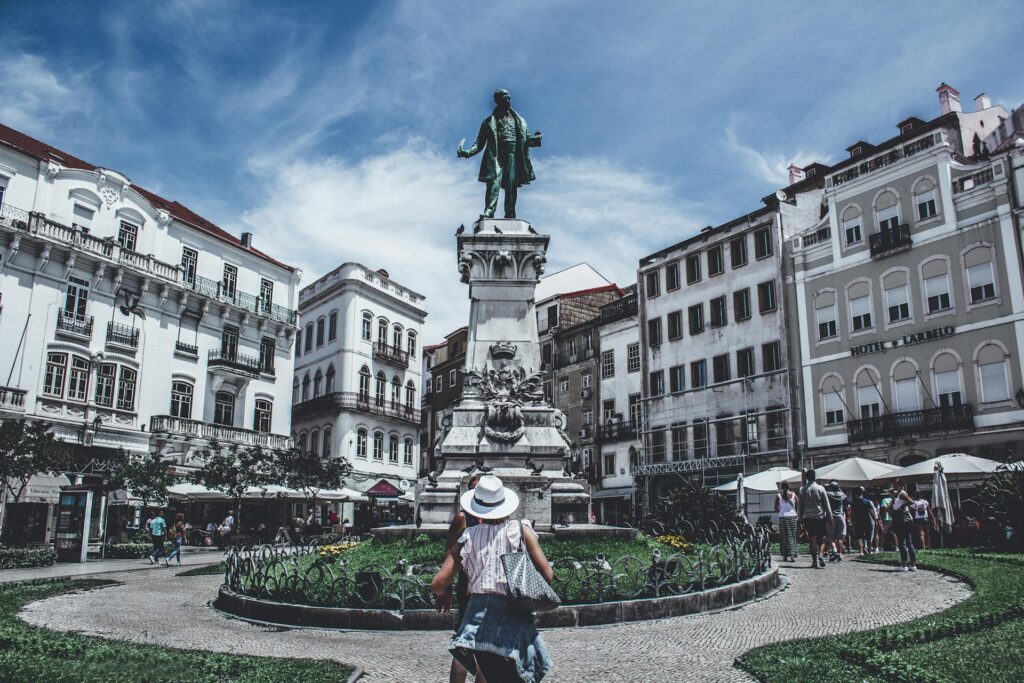“Living in Porto: A Guide for Foreigners” offers an insightful glimpse into the life that awaits expatriates in one of Portugal’s most enchanting cities. Nestled along the Douro River, Porto is renowned for its rich history, stunning architecture, and vibrant cultural scene, all while offering a cost of living that is attractively affordable compared to other European destinations.
This guide is designed to equip foreigners with the essential information needed to navigate the nuances of settling in Porto, from understanding the local real estate market to getting acquainted with the public transportation system.
Where is Porto?
Porto is located in the northern region of Portugal, along the Douro River estuary. It’s the country’s second-largest city, known for its significant role as an Atlantic port. This strategic location has historically contributed to Porto’s development as a vibrant trade and industry center.
The city is approximately 313 kilometers (about 194 miles) north of Lisbon, Portugal’s capital. Porto’s rich cultural heritage, combined with its modern amenities, makes it a key destination within Portugal for both residents and visitors.
Key Highlights about Porto
City
Porto, Portugal’s second-largest city, was placed 10th in Time Out’s list of the “Best Cities in the World.” This ranking reflects its growing popularity as a global hotspot. The city is loved for its charming mix of historical and modern elements, from its UNESCO-listed old town to the flourishing cultural scene. Porto also ranked highly in the 2024 Readers’ Choice Awards, a testament to its rising international profile and quality of life, making it a sought-after destination for travelers and expatriates.
Safety
Portugal is recognized globally for its safety, ranking as the seventh safest country in the world according to the 2024 Global Peace Index (GPI). This places Portugal just behind countries like Iceland, Ireland, Austria, New Zealand, Singapore, and Switzerland, highlighting its peaceful environment.
Furthermore, according to Numbeo’s 2024 Crime Index by Country, Portugal has a strong safety rating of 68.8 percent, making it one of the safer countries in Europe. This high safety level reflects the overall security and low crime rates, which also apply to Porto, contributing to the city’s attractiveness as a destination for residents, tourists, and investors alike.
Food
Porto’s food scene is gaining global recognition, with the city set to host the Michelin Guide Gala in 2025. This event is significant in the world of gastronomy, spotlighting Porto as a destination for fine dining. The city’s culinary offerings are a blend of traditional Portuguese flavors, such as the famous “francesinha” sandwich, and innovative cuisine from Michelin-starred chefs, positioning it as a rising star in Europe’s food map.
Housing
In the real estate market, Porto is experiencing dynamic changes. As reported by The Portugal News, many property owners are converting commercial spaces into residential units to capitalize on higher rental demand. This shift reflects the growing attraction of Porto as a place to live, with strong rental yields due to increased interest from expatriates and investors.
Moreover, Knight Frank’s 2023 Wealth Report ranked Porto 10th among the world’s fastest-growing luxury real estate markets. The city’s appeal to affluent international buyers is contributing to a boom in high-end property values, adding further appeal to investors seeking returns in Portugal.

Best Neighborhoods in Porto
Baixa
Nestled in the heart of Porto, Baixa stands as the city’s historic downtown area, celebrated for its quaint streets, lively ambiance, and deep cultural roots. Expats attracted to Baixa can relish in its close proximity to iconic landmarks, trendy cafes, and bustling markets, offering an enticing urban lifestyle experience.
Foz do Douro
Gracing the banks of the scenic Douro River estuary, Foz do Douro emerges as a picturesque coastal enclave, renowned for its pristine beaches, upscale amenities, and graceful waterfront promenade. Expats enchanted by Foz do Douro’s coastal allure can savor the delights of seaside living, panoramic ocean vistas, and a laid-back Mediterranean vibe.
Ribeira
Among Porto’s oldest and most cherished districts, Ribeira exudes an irresistible charm with its vibrant facades, cobblestone pathways, and bustling waterfront. Expats intrigued by Ribeira’s timeless appeal can delve into its charming squares, riverside cafes, and vibrant cultural milieu, immersing themselves in the quintessential Porto experience.
Sé
Tucked away in the heart of Porto’s historic core, Sé boasts medieval architecture, labyrinthine alleys, and an enchanting atmosphere. Expats eager to delve into Porto’s storied past and cultural tapestry can wander through Sé’s historic landmarks, traditional eateries, and bustling local scene, embracing the essence of this historic neighborhood.
Cedofeita
Located in Porto’s vibrant city center, Cedofeita is a dynamic neighborhood known for its eclectic blend of old and new. Expats drawn to Cedofeita can explore its trendy cafes, boutique shops, and lively street art scene, offering a vibrant urban lifestyle with a touch of bohemian charm.
Matosinhos
Situated just north of Porto, Matosinhos is a coastal gem renowned for its pristine beaches, fresh seafood, and laid-back atmosphere. Expats captivated by Matosinhos can enjoy beachfront living, surf-friendly waves, and a thriving culinary scene, making it an ideal choice for those seeking a relaxed coastal lifestyle with easy access to city amenities.
Cost of Living in Porto
The cost of living in Portugal presents a notable affordability advantage compared to other European capitals, making it an attractive option for expatriates from countries like the US or UK. For instance, rental prices in Porto are significantly lower than in Lisbon and major cities such as London, Paris, or New York.
To maintain the same standard of living in Porto as you would have with €4,100.0 in Lisbon (assuming you rent in both cities), you would need around €3,335.9. This indicates that the cost of living in Porto is approximately 18% lower than in Lisbon.
How much do I need to live in Porto?
According to data from Numbeo, the projected monthly expenses for a family of four are approximately €2,292.3, excluding rent. For a single individual, the estimated monthly costs amount to around €648.1, also excluding rent.
How much does it cost to buy a property in Porto?
Based on the latest data from February 2024 on Idealista, which is the largest real estate portal in Portugal, the average asking price for buying property in Porto stands at €3,546 per square meter.
When considering the wider Metropolitan area of Porto, the price decreases to €2,581 per square meter. It’s important to note that the final price will always depend on the neighborhood you choose to live in.
How much does it cost to rent an apartment in Porto?
Finding an apartment in Porto presents challenges due to high demand and limited availability, creating a competitive rental market. The city’s appeal, driven by its rich history, cultural vibrancy, and scenic landscapes, has intensified demand, particularly in sought-after neighborhoods.
Rental rates vary significantly based on location, with properties closer to downtown and the Douro River commanding higher prices:
- 1-bedroom apartment in the city center: €966.51
- 1-bedroom apartment outside the center: €742.26
- 3-bedroom apartment in the city center: €1,544.23
- 3-bedroom apartment outside the center: €1,201.97
Cost of Groceries
In terms of grocery and food costs, Porto is comparatively affordable when compared to other European cities. The city boasts a diverse array of shopping options, ranging from major supermarkets to neighborhood stores and traditional markets, ensuring ample choices for procuring your monthly necessities. Here’s an approximate breakdown of typical prices you can expect to encounter:
Cost of transportation in Porto
Other expenses to consider to live in Porto

Living in Porto: Pros and Cons
Pros of living in Porto
Rich Cultural Heritage: Porto is steeped in history and boasts a vibrant cultural scene with its medieval architecture, historic landmarks, and traditional neighborhoods like Ribeira and Sé.
Affordable Cost of Living: Compared to Lisbon or other European cities, Porto offers a relatively affordable cost of living, including housing, groceries, and entertainment, making it an attractive option for expats and locals alike.
Friendly Atmosphere: Porto is known for its warm and welcoming atmosphere, with friendly locals and a strong sense of community. Expats will find it easy to integrate into Porto’s social fabric and make new friends.
Vibrant Expat Community: Porto has a thriving expat community with people from all over the world, creating a diverse and cosmopolitan atmosphere where residents can connect with like-minded individuals and enjoy cultural exchange.
Cons of living in Porto
Hilly Terrain: Porto is known for its steep hills and uneven terrain, which can be challenging to navigate, especially for those with mobility issues.
Limited Job Opportunities: While Porto’s economy is growing, job opportunities may be more limited compared to larger cities, leading some residents to seek employment elsewhere.
Public Transportation: While Porto has a public transportation system, it may not be as extensive or efficient as in other European cities, leading to potential commuting challenges.
Climate: While Porto enjoys a mild Mediterranean climate, it can experience frequent rain showers, particularly in the winter months, which may not appeal to everyone.
Residence Permits and Visas to Portugal
Whether you’re a non-EU national eager to immerse yourself in the vibrant culture and sunny climate of Porto, or an EU national looking for a smooth transition into the city’s laid-back lifestyle, understanding the various pathways to legal residency is crucial.
Living in Porto as an EU Citizen
For EU Citizens planning to reside in Porto for more than three months, the process is straightforward. You’ll need to apply for a Registration Certificate (Certificado de Registo de Cidadão da União Europeia, CRUE) at the city hall of your residence area, with a fee of €15. This certificate is valid for up to five years and requires renewal thereafter.
Living in Porto as a non-EU Citizen
Non-EU nationals intending to live in Porto must apply for a Portuguese residency visa prior to arrival. Upon entry, obtaining a residence permit is necessary. There are multiple pathways for non-EU citizens to secure residency in Portugal, such as the D3 Visa and Work Visa. Below, you’ll find the most relevant options.
International Schools in Porto
As a legal resident in Porto, you have the opportunity to enroll your children in a public school within your residential area, free of charge. These schools offer accessible education options; however, it’s essential to note that Portuguese is the primary language of instruction. This may require additional language learning support for children who are not fluent.
Alternatively, if you prefer an international educational environment, our guide provides detailed insights into the various international schools available in Porto. Below, you will find information on some of the most well-known international schools in the city, designed to cater to diverse educational needs and language backgrounds.
These schools allow your children to continue their education in languages such as English, French, or German, among others, ensuring a seamless transition into their new surroundings.

Why work with us?
Local Expertise
Our deep understanding of Portugal sets us apart. We focus exclusively on this vibrant country to offer in-depth and practical advice. By concentrating our expertise here, we ensure you receive the most detailed and relevant guidance.
Holistic Approach
Your journey, streamlined through one point of contact. We offer an all-encompassing service, guiding you from choosing the right visa to finding your perfect home and easing your transition.
Transparent Service
Our advice is tailored to your best interests, drawing on years of experience to save you both time and money. Our fees are straightforward and competitive, without any hidden costs or upselling.
Simple Process
Our innovative use of technology simplifies your involvement in the bureaucratic process. We understand the customer experience firsthand and are dedicated to making your journey as smooth as possible.
Frequently Asked Questions About Living in Porto
What is the cost of living in Porto compared to other European cities?
Generally, the cost of living in Porto is lower than in many other European cities, particularly in terms of housing and dining out. However, it can vary depending on your lifestyle and preferences.
Is it easy to find accommodation in Porto?
Yes, it’s relatively easy to find accommodation in Porto. There are various options available, including apartments, houses, and shared living spaces. It’s recommended to start your search early, especially during peak seasons.
What is the transportation system like in Porto?
Porto has a well-developed public transportation system, including buses, trams, and the metro. The city is also quite walkable and bike-friendly, making it easy to get around without a car.
What are some popular neighborhoods to live in Porto?
Some popular neighborhoods in Porto include Ribeira, Cedofeita, Foz do Douro, and Boavista. Each neighborhood has its own unique charm and amenities, so it’s essential to consider your preferences and needs when choosing where to live.
Is Porto a safe city to live in?
Yes, Porto is generally considered a safe city to live in. Like any urban area, it’s essential to take common-sense precautions and be aware of your surroundings, especially in crowded or touristy areas.
What is the healthcare system like in Porto?
Portugal has a public healthcare system that provides basic medical care to residents, including foreigners with residence permits. Additionally, there are private healthcare options available for those who prefer or require additional services.
What is the weather like in Porto?
Porto has a Mediterranean climate, with mild, rainy winters and warm, dry summers. The weather is generally pleasant throughout the year, making it a comfortable place to live.
Is Porto a good city for expatriates?
Yes, Porto is a popular choice for expatriates due to its lower cost of living, vibrant cultural scene, welcoming locals, and good quality of life. It also offers an active expat community, making it easier to integrate.
What job opportunities are available in Porto?
Porto’s economy is growing, with opportunities in tourism, tech, startups, and education (especially English teaching). Fluency in Portuguese can significantly improve job prospects, but some international companies hire English speakers.
How is the food and dining culture in Porto?
Porto is famous for its food, particularly traditional dishes like Francesinha and Bacalhau. Dining out is affordable, with numerous cafes, bakeries, and restaurants offering delicious meals, often paired with local wines.
What are the educational options in Porto?
Porto has reputable public and private schools, including international schools that offer English, French, or IB curriculums. Universities like the University of Porto are highly regarded for higher education.
What leisure activities can you enjoy in Porto?
Porto offers plenty of leisure options, including exploring historic sites like the Ribeira district, taking Douro River cruises, enjoying nearby beaches, hiking trails, or indulging in wine tastings at local cellars. The city also hosts numerous festivals and cultural events throughout the year.




